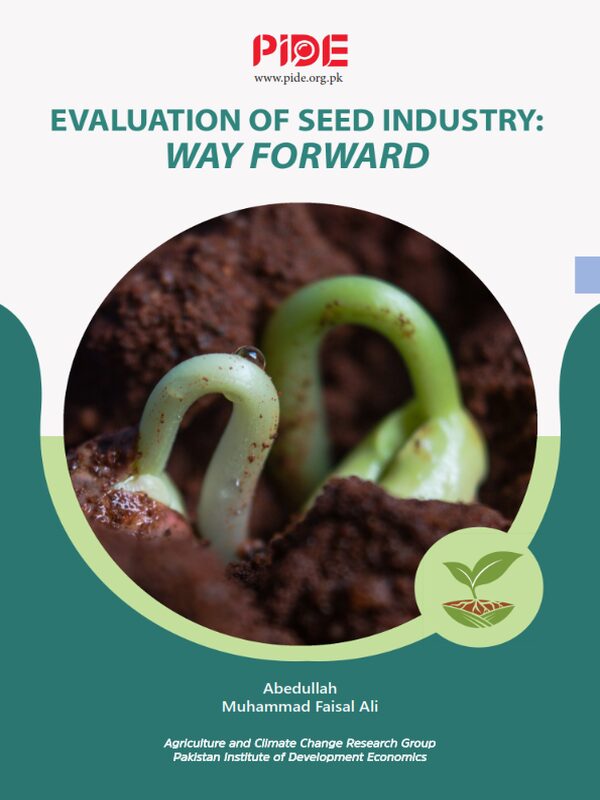Evaluation of Seed Industry: Way Forward
Executive Summary
Genetically pure and high-quality seeds are imperative to achieve the objective of high productivity in the agriculture sector. However, the current regulatory processes involve numerous steps and engage multiple government departments, resulting in significant delays and costs. It has badly damaged the growth and potential benefits of both agriculture and the seed sector. Different stakeholders are involved in the development and marketing of seed business considering that the seed sector is over-regulated. Due to over-regulation private sector is reluctant to invest in Research and Development of the seed sector. In the modern marketing system, the reputation of a brand is more valuable than the approvals from Federal Seed Certification and Registration Department (FSC&RD). It is important to note the government is spending more than 800 million per annum on FSC&RD but its certification does not earn any value in the market. Hence, there is a pressing need to liberalize the seed sector by transitioning from a centrally managed variety approval system to establish brands having intellectual property rights (IPRs).
The majority of the certified seed is produced under the supervision of provincial seed corporations. For the marketing and multiplication of seed, the provincial seed corporation hand over these seeds to the private sector. This has impeded the growth of seed sector. Hence, the informal sector remains the predominant source of seed supplier in the agriculture sector. Further, a large number of non-registered firms are involved in selling seed without proper labeling and branding. This has led to spread low quality seeds and are considered one of the major source of low productivity in agriculture sector of Pakistan.
The primary aim of agricultural research and development is to enhance crop productivity and profitability. Despite the introduction of numerous crop varieties in Pakistan, the sector has not fully tapped into its potential. In comparison to global standards, the country notably falls behind in crop productivity. The primary reason of this productivity gap lies in the insufficient availability of quality seeds and the inefficiency in delivering extension services. Bridging this gap necessitates the implementation of policies and interventions geared towards providing small-scale farmers with increased access to quality seeds, technology, training, and financial support. These measures hold the promise of empowering small-scale farmers, enabling them to enhance their crop yields and uplift their livelihoods. Elevating the average farmer’s yield to match that of progressive farmers in just five major crops (wheat, rice, maize, cotton, and sugarcane) could yield a cumulative gain of Rs.1722 billion during 2021-22.
Based on all the observations, our recommendations to liberalize the seed sector are
- Abolish the stringent seed certification to attract private sector investment and to create space for its growth as poorly regulated seed market promotes low quality seeds, affecting agricultural productivity
- Proposes a transition from a centrally controlled variety approval system to free market mechanism where entry and exit are free without any restriction.
- Brands/companies have to submit a surety bond issued by banks to FSC&RD only to get registered. The FSC&RD should be bound to issue the registration on the same day after receiving the surety bond issued by banks. Banks will issue the surety bond after receiving the amount mentioned in the surety bond in their reserve which will be kept by the bank until the brand/company cancel its registration with FSC&RD.
- The involvement of the public sector in the seed production business and price regulation need to completely abolish.
- In the proposed set up, the role of FSC&RD will be only to keep records of registered firms. Any farmer can launch a complaint if seed do not contain characteristics mentioned in the labeling. In the event of a proven violation, their registration licenses may be revoked, and the bonded amount can be seized. This amount of surety bond can be used to repay the loss of the consumer or can be handed over to government to settle the dispute. If complainant found guilty, he must have to a face a fine equal to the amount covering all the expenses involved during the whole procedure.
- Granting intellectual property rights IPRs system needed to be cleaner and justified, which is only possible with the engagement of the private sector.
There is a need to establish specialized courts having sufficient knowledge and expertise about biosafety systems, tools, genes, and procedures used in the development of transgenic varieties to decide confrontation on IPRs or the existing courts should seek the technical expertise from the relevant experts




